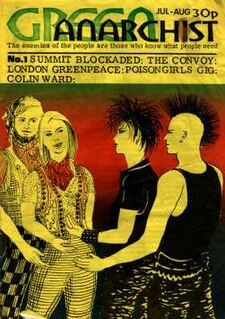Anarchism is a political philosophy and movement that is skeptical of all justifications for authority and seeks to abolish the institutions they claim maintain unnecessary coercion and hierarchy, typically including, though not necessarily limited to, governments, nation states, and capitalism. Anarchism advocates for the replacement of the state with stateless societies or other forms of free associations. As a historically left-wing movement, usually placed on the farthest left of the political spectrum, it is usually described alongside communalism and libertarian Marxism as the libertarian wing of the socialist movement.

The Green Anarchist, established in 1984 in the UK, was a magazine advocating green anarchism.
Propaganda of the deed is specific political direct action meant to be exemplary to others and serve as a catalyst for revolution.
Robert Graham may refer to:
The history of anarchism is as ambiguous as anarchism itself. Scholars find it hard to define or agree on what anarchism means, which makes outlining its history difficult. There is a range of views on anarchism and its history. Some feel anarchism is a distinct, well-defined 19th and 20th century movement while others identify anarchist traits long before first civilisations existed.
Löw is a surname of German and Yiddish origin. Another romanization of the Yiddish name לייב is Leib. It may refer to:
National-anarchism is a right-wing nationalist ideology which advocates racial separatism, racial nationalism, ethnic nationalism, and racial purity. National-anarchists claim to syncretize neotribal ethnic nationalism with philosophical anarchism, mainly in their support for a stateless society, while rejecting anarchist social philosophy. The main ideological innovation of national-anarchism is its anti-state palingenetic ultranationalism. National-anarchists advocate homogeneous communities in place of the nation state. National-anarchists claim that those of different ethnic or racial groups would be free to develop separately in their own tribal communes while striving to be politically horizontal, economically non-capitalist, ecologically sustainable, and socially and culturally traditional.
John B. Smith may refer to:
Anarchist law is a body of norms regarding behavior and decision-making operative within in an anarchist community. The term is used in a series of ongoing debates within the various branches of anarchist theory regarding if and how norms of individual and/or collective behavior and decision-making should be created and enforced. Although many anarchists would consider "anarchist law" simply synonymous with natural law, others contend law in anarchy would have additional, unique elements. Over the course of the last two hundred years as anarchism has grown and evolved to include diverse strains, there have been different conceptions of "anarchist law" produced and discussed, or used in practice by anarchist networks such as Peoples' Global Action or Indymedia.

Anarchism in Korea dates back to the Korean independence movement in Korea under Japanese rule (1910-1945). Korean anarchists federated across their end of the continent, including forming groups on the Japanese mainland and in Manchuria, but their efforts were perforated by regional and world wars.
Contemporary anarchism within the history of anarchism is the period of the anarchist movement continuing from the end of World War II and into the present. Since the last third of the 20th century, anarchists have been involved in anti-globalisation, peace, squatter and student protest movements. Anarchists have participated in violent revolutions such as in those that created the Makhnovshchina and Revolutionary Catalonia, and anarchist political organizations such as the International Workers' Association and the Industrial Workers of the World have existed since the 20th century. Within contemporary anarchism, the anti-capitalism of classical anarchism has remained prominent.
Anarchism: A Documentary History of Libertarian Ideas is a three-volume anthology of anarchist writings edited by historian Robert Graham. The anthology is published by Black Rose Books. Each selection is introduced by Graham, placing each author and selection in their historical and ideological context. The focus of the anthology is on the origins and development of anarchist ideas; it is not a documentary history of the world's anarchist movements, although the selections are geographically diverse.
Henry is an English and French male given name and an Irish and French surname, borrowed from Old French, originally of Germanic origin (Haimirich) from the elements haim ("home") and ric ("powerful"). Equivalents in other languages are Anraí (Irish), Eanruig, Enrico, Amerigo (Italian), Enrique (Spanish), Heinrich (German), Henning (Swedish), Henri, Henrik, Henrique (Portuguese), Henryk (Polish), (H)enric, Hendrik (Dutch), and Genrikh (Russian), among others.
Marcus Graham was an anarchist active in the United States from the 1910s to his death in the 1980s. Graham was born in Canada. "Marcus Graham" was a pseudonym for "Shmuel Marcus."
Internet commentator means a person who posts or publishes comments on the Internet.
Platformism is a form of anarchist organization that seeks unity from its participants, having as a defining characteristic the idea that each platformist organization should include only people that are fully in agreement with core group ideas, rejecting people who disagree. It stresses the need for tightly organized anarchist organizations that are able to influence working class and peasant movements.
Marcus William Robert deVere Graham was an English entomologist who specialised in the Chalcidoidea superfamily of the Hymenoptera. He was associated with both Oxford University and Trinity College, Dublin.
Anarchism in Norway first emerged in the 1870s. Some of the first to call themselves anarchists in Norway were Arne Garborg and Ivar Mortensson-Egnund. They ran the radical target magazine Fedraheimen which came out 1877–91. Gradually the magazine became more and more anarchist-oriented, and towards the end of its life it had the subtitle Anarchist-Communist Body. The anarchist author Hans Jæger published the book "The Bible of Anarchy" in 1906, and in recent times Jens Bjørneboe has been a spokesman for anarchism – among other things in the book "Police and anarchy".

Marcus "djWHEAT" Graham is an American shoutcaster and the former Director of Creator Development at Twitch, where he worked at from 2011 to January 2022.


